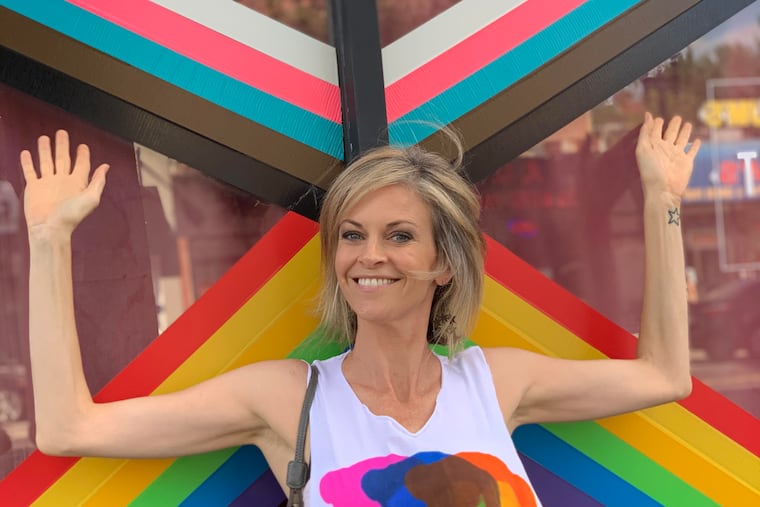Coming out can be isolating. This woman created Sip City Mixer, ‘a traveling queer bar,’ to bring LGBTQ and non-binary folks together.
Sip City Mixer has grown in popularity and added more events and subgroups to its inclusive community.

Rebecca Kenton found that in her 30s she began questioning her identity. And while she had plenty of straight friends, it sent her on a search for her lesbian community.
“I came out later in life. I was in heterosexual marriage with two young children, and I wanted to explore this side of myself,” said Kenton.
What she found was not the easygoing acceptance she had imagined, but a “cliquish” community that she said made connecting difficult. So, after four years of dissatisfying online and real-life attempts at connection, she decided to build what she sought: mixers that were safe, fun, and encouraged meaningful interaction for the queer community.
In 2017, Kenton was given the opportunity to take over a small Facebook group of about 100 lesbian women and unveiled Sip City Mixer, which hosts special events throughout the area catering to LGBTQ+ women and nonbinary folks.
“I wanted to create a space that was intentionally welcoming, not just space to go and stand around with other lesbians,” said Kenton.
Combating social disconnection
Social disconnection has become a growing dilemma throughout the country. About half of U.S. adults report experiencing loneliness, with some of the highest rates among young adults, according to an advisory report released last year by U.S. Surgeon General Vivek Murthy. This “loneliness epidemic” is more widespread than diabetes or obesity and is as dangerous to your physical health as smoking up to 15 cigarettes a day.
It is also detrimental to a person’s mental well being as well as community cohesiveness. “[T]he harmful consequences of a society that lacks social connection can be felt in our schools, workplaces, and civic organizations, where performance, productivity, and engagement are diminished,” Murthy wrote.
» READ MORE: Are you lonely? These Philadelphians are too.
The report also promised to show Americans how to “build more connected lives and a more connected society.”
But Kenton said she already knows what is needed: the return of face-to-face interactions.
“I think people are looking for something real, and social media is just not satisfying,” she said. “Apps are fun for a minute. It’s the difference between junk food and a nourishing meal. Social media is junk food and space filler.”
Sip City Mixer has grown in popularity
Over the years, Sip City Mixer has grown not according to a business plan but to Kenton’s gut instinct. She described it as “a traveling queer bar. We go all over the city to welcoming businesses, bringing them revenue and us a place to gather. There are anywhere from 100-1,000 attendees, depending what the theme of the gathering is.” Sip City Mixer’s main Instagram account has over 13,500 followers.
With increased popularity and more events, Kenton decided to turn her hobby into an entrepreneurial moment. “It got popular very quickly, and I was feeding off other people’s excitement,” she said.
The daughter of New England educators who believed in community service and fought for civil rights, Kenton also felt pulled to ensure Sip City Mixer was inclusive and diverse. The original Facebook group she inherited was primarily white women.
”Philadelphia is known as a segregated city. By my experiences, New York, D.C., and Atlanta are much more racially integrated than Philadelphia,” Kenton, said adding, ”I wanted to make it more inclusive. I wanted people of color, trans people, and others to feel welcomed. I wanted it to be more queer than strictly lesbian.”
From her main group, she started several Sip City subgroups, including one for outdoor enthusiasts and another for introverts or the more quiet. She also started a subgroup for queer people of color (QPoC), Melamixin, which she has passed onto others to run.
“Melamixin’s name will change but will also now be 100% run by QPoC leaders … It’s always been my goal to transition Melamixin to a 100% POC run and hosted group,” Kenton explained in a recent Instagram post.
Sip City Mixer’s inclusive events have also expanded to the suburbs and South Jersey. In light of the recent presidential election, Kenton said, there is an even greater need for queer community members to have safe and nurturing places to gather.
» READ MORE: LGBTQ rights in Pa. must be protected before the Trump presidency
Next up for Sip City Mixer
Almost eight years in, and interest is still high. Sapphic Sparkles, the group’s first New Year’s Eve event, is Dec. 31 at Rosy’s Taco Bar East. In January, Kenton is hosting her first speed-dating event for 30-somethings.
“I have over 100 four-page applications for 20 spaces,” she said, noting that she’ll likely add speed-dating events in February and March to keep up with demand. Kenton is also considering opening a lesbian bar, given the city’s lack of one. Philadelphia’s last lesbian bar, Toasted Walnut, closed in January 2021.
Developing her personal community took a lot of persistence, but ultimately it happened. Now, Kenton explained, she wants to make that journey less difficult for others.
“I built it for myself,” she said. “Sip City Mixer builds it for other people.”